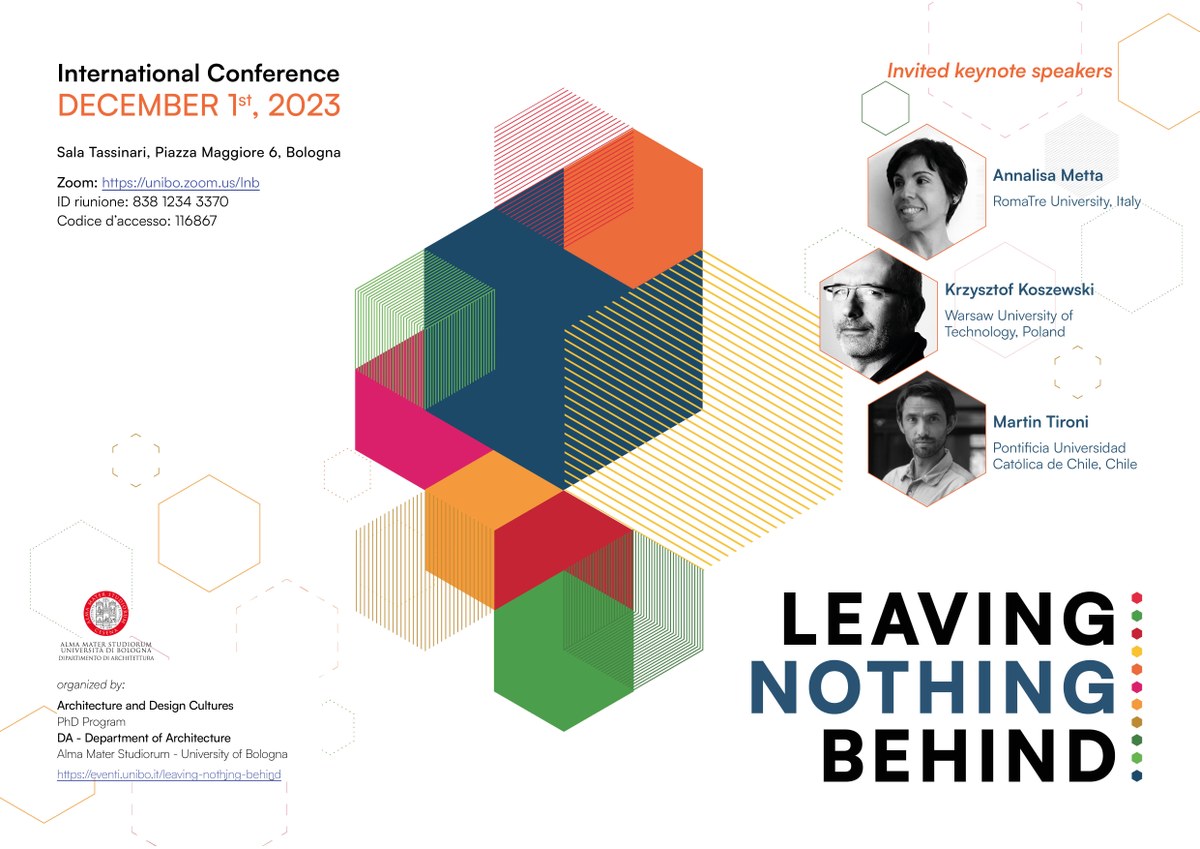
In light of new global and local phenomena bringing unprecedented effects on communities and their settlements, there are several environmental, social and political issues that must be addressed. The 2030 Agenda for Sustainable Development (UN General Assembly, 2015) proposes a vision for sustainable development, asking for concerted efforts towards building an inclusive and resilient future for people and the planet. According to the Sustainable Development Goals (SDGs), economic growth, social inclusion and environmental protection are the three interconnected pillars for the well- being of individuals and societies. The SDGs put equality and non-discrimination at the core of a universal call to action to tackle the growing poverty, empower vulnerable communities and groups, address the climate emergency, and rebalance the relationship between people and nature.
The major contemporary challenge appears to be finding new ways to survive the threatening consequences of various pressures, which increasingly appear to be interconnected: thus, the effects of climate change are intertwined with contractions and migrations, energy and environmental crises with wars, and the global pandemic emergency has demonstrated unprecedented relationships with digital and cultural innovations.
New approaches are needed to regenerate cities and territories, to reduce soil consumption, promote the use of renewable resources and strengthen the values of local communities. Accordingly, it is critical to shift from an anthropocentric to an ecological perspective, in order to design territories and societies which effectively support health and well-being for the benefits of humans and other species. Ecologically-oriented planning can lead to responsible decisions for spatial, social and cultural justice. It is more and more evident that new design visions can be the tool to address issues such as territorial imbalances, the destruction of marginalized communities and places, diversity inclusion and socio-cultural interactions between humans and the surrounding environment, as well humans and other species, in the whole earth system.
Furthermore, our past lives on in the evidence of our cultural heritage, tangible and intangible, gets reflected in natural landscapes and unique ecological resources, is stored in our digital archives data. All of these elements play a crucial role in re- thinking new territorial assets and re-shaping new relationships to respond to contemporary challenges. Contemporary technologies, like data modelling, computer vision and machine learning, provide with a huge support in different disciplines, from architecture to environmental sciences, from humanistic knowledge to economics, giving the possibility to experiment with innovative design approaches.
A concerted and shared effort by all is needed at this point, in the pursuit of leaving nothing behind. Urgent actions are required from each of us - scientific community, practitioners and policy makers alike - to establish networks in defense of people, especially those living in vulnerable conditions and/or in the presence of war, species and resources, so that none are lost.
Leaving Nothing Behind is an interdisciplinary conference which invites all interested in these topics to a conversation thinking out of boxes and going beyond borders, to re-define new interactions among different sectors and disciplines.
In order to explore different dimensions of inclusiveness, justice and non-discrimination, the conference is structured in three tracks:
-
Leaving NO DATA behind,referringtotheimplementation of emerging technologies in sustainable ways, as inclusive solutions for future data access, management and preservation;
-
Leaving NO LANDSCAPE behind, addressing issues of spatial justice and environmental justice, as well cultural and natural heritage protection and enhancement;
-
Leaving NO SPECIES behind, suggesting new reflections on how co-design relations between human and non- human spheres.
Leaving Nothing Behind is an interdisciplinary conference organised by the PhD programme in Architecture and Design Cultures, Department of Architecture, University of Bologna.
ORGANISING COMMITTEE
The Organising Committee is composed of the members of the XXXVII PhD Cycle in Architecture and Design Cultures: Margherita Ascari, Igor Piotr Bajena, Benedetta Baldassarre, Alberto Calleo, Enrico Chinellato, Maria Antonietta De Vivo, Lorela Mehmeti, Eleonora Melandri, Zeno Mutton, Arianna Pasa, Alba Paulì, Davide Pletto, Tommaso Rovinelli, Aniseh Saber, Ruoran Yan.
SCIENTIFIC COMMITTEE
The Scientific Committee is composed of the members of the Academic Board of the PhD Programme in Architecture and Design Culture, Department of Architecture, Alma Mater Studiorum - University of Bologna.